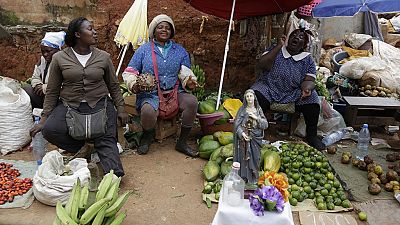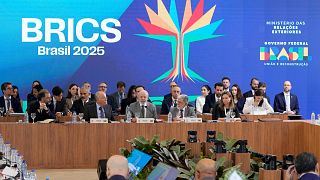Africa
At a time when Africa’s COVID-19 caseload was at over 300,000 cases and close to 10,000 deaths, governments introduced several containment measures like lockdowns and border closures to prevent further spread.
The virus and accompanying restrictions have greatly impacted livelihoods and businesses in both the government and private sector. Sectors like transport, travel and tourism have been badly hit by border closures and restrictions on movement.
This article specifically explores the impact on agriculture and looks at how Africa’s development partners are supporting efforts to help individuals and enterprises recover.
Why Agriculture?
The restrictions imposed to prevent spread of the coronavirus caused disruptions in food chains, which in turn poses a twin threat of exacerbating poverty and hunger in vulnerable populations. Millions of people in rural areas rely on subsistence farming for their food and supplementary income.
“Agriculture contributes 65% of Africa’s employment and 75% of its domestic trade. However, the rich potential of agriculture as a tool to promote food security and fight poverty is at risk from the effects of COVID-19,” former African leaders Olusegun Obasanjo and Hailemariam Desalegn said in explaining why COVID response should address agriculture.
And yet several factors including locust invasions, floods and insecurity in parts of Africa have contributed to a growing food insecurity crisis.
Thankfully, a number of African countries placed agriculture in the essential services category and made efforts to keep borders, ports open for cargo.
How Covid affected farmers
Measures taken by governments to prevent the spread of the coronavirus have affected transport, which in turn impacts many other processes in the food chain. Access to markets be it to buy inputs or sell outputs has been heavily hit and farmers say they have been forced to sell produce at giveaway prices.
“Governments are rolling out large-scale campaigns against the coronavirus, and battle plans should include measures aimed at lessening the shocks to their food supply chains,” FAO’s Chief Economist Maximo Torero Cullen recently warned.
The Food and Agriculture Organisation (FAO) warned in 2019 that up to 250 million people in Africa are considered to be extremely food insecure.
Border closures and restrictions negatively affect global food trade. “One of every five calories people eat have crossed at least one international border, up more than 50 percent from 40 years ago,” Torero explained.
Countries like Kenya which export vegetables and flowers to the European Union are reeling from reduced demand for their produce.
“Supply disruptions have been isolated; however, logistics are under pressure and costs are being driven up by travel restrictions, border checks, curfews, delays caused by staff shortages, and a general reduction in volume,” a McKinsey report said this month.
What needs to be done
FAO’s Torero believes governments have a significant role to play in helping smallholder farmers recover from the Covid disruputions.
“Temporary cash handouts for poor farmers are essential, as well as grants to restart production. Banks can waive fees on farmers’ loans and extend payment deadlines.”
“Governments can during the emergency make a point of purchasing agricultural products from small farmers to establish strategic emergency reserves for humanitarian purposes.”
Collaboration and integration
Munu who also works with the Economic Policy Research Center in Uganda says at a regional level, East African countries have done well with policy implementation.
“What they’ve done in terms of promoting agriculture is trade, extending market access, for instance in the East African communities, implementing the common markets which allows free movement of goods and services across the member states.”
Uganda, Kenya, Rwanda and other East African nations have also collaborated in their Covid response, jointly tackling issues like testing of truck drivers at border points and tracking of cargo/drivers.
AfDB’s support is hinged on ownership of the agricultural agenda by national governments.
“The other aspect that is critical is regional integration. More than ever supply chains will need to be resilient to be able to provide nutritious food to Africa’s populations, hence regional coordination is important to ensure that regional trade for food is enhanced, as well as, increased marketable surplus for value addition,” Toda said.
.embed-container { position: relative; padding-bottom: 56.25%; height: 0; overflow: hidden; max-width: 100%; } .embed-container iframe, .embed-container object, .embed-container embed { position: absolute; top: 0; left: 0; width: 100%; height: 100%; }
AfDB’s commitment to agriculture
African Development Bank (AfDB) is supporting African governments and businesses, with an aim of lessening the economic and social impact of Covid 19.
“There is also a framework that is being developed for emergency operations, called the FEED AFRICA RESPONSE TO COVID-19 (FAREC) and this includes short, medium longer term options to structure our support to Regional Member countries,” Atsuko Toda, the director of Agriculture Finance and Rural Development Department at AFDB said.
“Supporting farmers to help them afford inputs is a very good investment. That is why the Bank is advocating input support in our emergency interventions.”
Through its Feed Africa strategy, AfDB has been supporting companies like the Moroccan phosphate company across Africa, especially to increase the capacity of production for Office Chérifien des Phosphates (OCP) to serve the African fertilizers market.
Special consideration has also been made for countries fighting the pandemic alongside pre-existing security headaches.
A $20m grant was recently approved to support vulnerable communities in the Sahel region (Mali, Burkina Faso, Niger, Chad and Mauritania) where governments are fighting extremists. Somalia’s Covid response has also been supported by the bank with $2.6m, specifically to finance water and sanitation programs.
Challenges
Martin Luther Munu, an economist at the Institute for Globalisation and International Regulation IGIR says Africa’s agricultural policies are affected by inadequate political will to improve the sector.
“Africa is not a very integrated continent like the EU where the common agricultural policy is very strong and has a huge response to the crisis,” Munu said.
“We have the 2014 Malabo declaration, where the AU members committed to allocate 10% their national budget to agriculture, but this has never been realised.”
AfDB says lockdowns and other Covid mitigating measures also affected the speed at which it could implement projects, especially with the private sector.
“We have to also keep in mind that it’s a big change, everything came very quickly and very rapidly and reallocating the food allocation within a couple of weeks, redesigning the whole strategy within a couple weeks for the whole year in order to cope with the crisis, it’s been a big success for the bank to do that,” Eren Kelekçi, the bank’s Chief of Private Sector and Blended Finance Investment Agriculture and Rural Finance Division said.
The Covid crisis has caused many African countries to take on even more debt, allocating borrowed resources to health, logistics and communication.
Even before the pandemic, many experts warned against the scale of Africa’s debt and non-governmental organisations have been petitioning lenders to forgive some of the debt. Many of Africa’s lenders like China however opted for debt relief, to enable countries to allocate resources in the fight against Covid.
AfDB believes that efforts to relieve governments of financial strain through its interventions would go a long way in helping them manage their debt obligations.
“From the private sector perspective, it is not something we not are looking at confidently. We might read just the cash flow projections and ease a little bit in terms of payment deadlines maybe,” Kelekçi said.
The World Health Organisation has advised countries to work towards learning to live with the coronavirus. This means that governments must draw long-term plans to cushion affected individuals and communities.
Restrictions on movement and travel must be steadily lifted so farmers can have uninterrupted access to markets. Efforts of partners like the African Development Bank (AfDB) to provide financing and inputs like fertilisers to cushion farmers who risk losing their produce, incomes and life’s work because of factors like coronavirus, floods, locusts and insecurity among others.














Go to video
Sub-Saharan Africa’s economy set to rebound, but Jobs still a major hurdle
01:16
Africa mourns Pope Francis, a voice for peace and justice
01:14
ECOWAS Meets in Ghana to Tackle Member Withdrawals
00:58
Senegal: MP Proposes High Treason Charges Against Former President Macky Sall
Go to video
EU foreign ministers discuss Ukraine, Syria and EU-African relations in Luxembourg.
Go to video
Relative relief in Africa after tariff pause